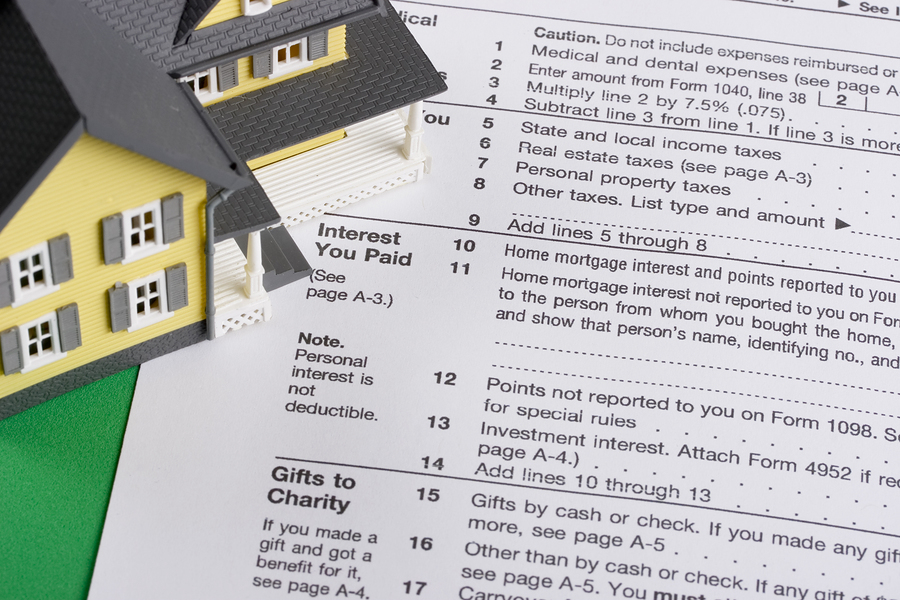 1. The purchase
1. The purchase
When buying your own home, most of the expenses are not tax deductible. But there is one exception that is worth finding.
The IRS says you can deduct interest in the year that it is paid, and that is usually part of each monthly loan payment. In addition, if the day you purchase is on any day other than the first of the month, you will likely pay a charge for “daily interest” between the day of closing and the end of the month. Look on line 901 of your HUD settlement statement.
Much more importantly, the IRS says that, in most cases, loan discount points and origination fees are tax deductible to the buyer, regardless of who pays them. Look at lines 801 and 802 of your settlement statement and see if you hit the jackpot. This is a particularly unusual deduction because you get the benefit even if the seller paid your closing costs. And because origination fees of 1% and more are common, this can amount to a lot of cash.
2. Mortgage interest
In general, you can deduct interest charged on a loan used to acquire or improve your principal residence in the year that it is paid. In the early years of a loan, most of your monthly payment is interest, so this can really add up. If you are in a 28% federal tax bracket, this can have the effect of lowering your borrowing costs by almost a third, depending on which state you live in. This is truly nothing more than a subsidy to home owners, and it’s a very popular deduction.
In addition, you can always deduct interest on an additional $100,000 of mortgage debt, which can be used for any purpose. This is called the “Home Equity Loan” exception, and it allows you to tap into your home equity for any purpose. This gives home owners the ability to do what is called “debt-shifting.” For example, if you live in an apartment and have a credit card balance of $10,000 at 18% interest, none of that interest would be deductible. But if you bought a house, obtained a home equity loan for $10,000 and paid off the credit card, then ALL of the interest expense becomes automatically deductible. Furthermore, the rate on the home equity loan is likely to be around prime plus one or two, usually much lower than credit card rates. This same technique works with any and all personal debt, from car loans to consolidation loans – with only one hitch. In every home equity loan, you have pledged your house as collateral for the loan. If you fail to pay the payments as agreed, you could lose your house to foreclosure. So be careful in using this technique.
3. The sale
This is the best. In fact, I can hardly believe this myself. Here’s how it works:
If you have owned and occupied your principal residence for at least two of the past five years, you can earn up to $500,000 on the sale of that house and pay no federal income tax whatsoever. That’s assuming you are married – singles get up to $250,000 tax free. And here comes the kicker:
You can do this as often as every two years for the rest of your life.
This is as good an excuse for getting married as I have ever heard. Buy a fixer-upper in an up and coming neighborhood, work on it nights and weekends for two years, then sell it at a nice profit and pocket the cash, totally free of federal taxes. And most states recognize the federal exclusion, so you put the cash away totally tax free. You don’t have to re-invest, you don’t have to be age 55, and you can do this every two years forever. No, I’m not kidding.
The one restriction is that you MUST own and occupy the house as your principal residence, so don’t try this on a rental property by pretending you live there when you don’t. And there are some unclear rules about how you can take a partial exclusion if you live there less than two years, but we don’t really know what they mean yet, so I recommend you stay there two years.
Many of these benefits came into being with the 1997 tax law, but lots of folks are just finding out about them now, so buy and sell to your heart’s content. Just don’t plan on staying forever!
The Buyer’s Agent of Asheville is a local real estate firm dedicated entirely to assisting home buyers find their home. We provide laser focus (see the homes that match your search criteria), fierce negotiating skills (save you money) and detailed transaction management (you don’t need to stress). Located at 82 Patton Avenue, Suite 205 in Asheville, North Carolina. Contact the Buyer’s Agent at 828-210-4663.







